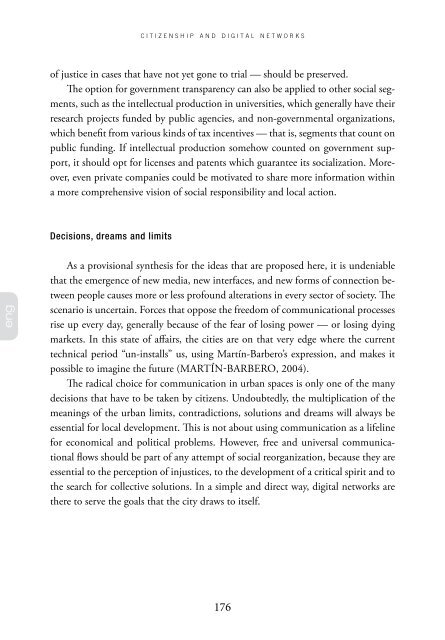Sergio Amadeu da Silveira - Cidadania e Redes Digitais
Sergio Amadeu da Silveira - Cidadania e Redes Digitais
Sergio Amadeu da Silveira - Cidadania e Redes Digitais
You also want an ePaper? Increase the reach of your titles
YUMPU automatically turns print PDFs into web optimized ePapers that Google loves.
eng<br />
c i t i z e n s h i p a n d d i g i t a l n e t w o r k s<br />
of justice in cases that have not yet gone to trial — should be preserved.<br />
The option for government transparency can also be applied to other social segments,<br />
such as the intellectual production in universities, which generally have their<br />
research projects funded by public agencies, and non-governmental organizations,<br />
which benefit from various kinds of tax incentives — that is, segments that count on<br />
public funding. If intellectual production somehow counted on government support,<br />
it should opt for licenses and patents which guarantee its socialization. Moreover,<br />
even private companies could be motivated to share more information within<br />
a more comprehensive vision of social responsibility and local action.<br />
Decisions, dreams and limits<br />
As a provisional synthesis for the ideas that are proposed here, it is undeniable<br />
that the emergence of new media, new interfaces, and new forms of connection between<br />
people causes more or less profound alterations in every sector of society. The<br />
scenario is uncertain. Forces that oppose the freedom of communicational processes<br />
rise up every <strong>da</strong>y, generally because of the fear of losing power — or losing dying<br />
markets. In this state of affairs, the cities are on that very edge where the current<br />
technical period “un-installs” us, using Martín-Barbero’s expression, and makes it<br />
possible to imagine the future (MARTÍN-BARBERO, 2004).<br />
The radical choice for communication in urban spaces is only one of the many<br />
decisions that have to be taken by citizens. Undoubtedly, the multiplication of the<br />
meanings of the urban limits, contradictions, solutions and dreams will always be<br />
essential for local development. This is not about using communication as a lifeline<br />
for economical and political problems. However, free and universal communicational<br />
flows should be part of any attempt of social reorganization, because they are<br />
essential to the perception of injustices, to the development of a critical spirit and to<br />
the search for collective solutions. In a simple and direct way, digital networks are<br />
there to serve the goals that the city draws to itself.<br />
176


